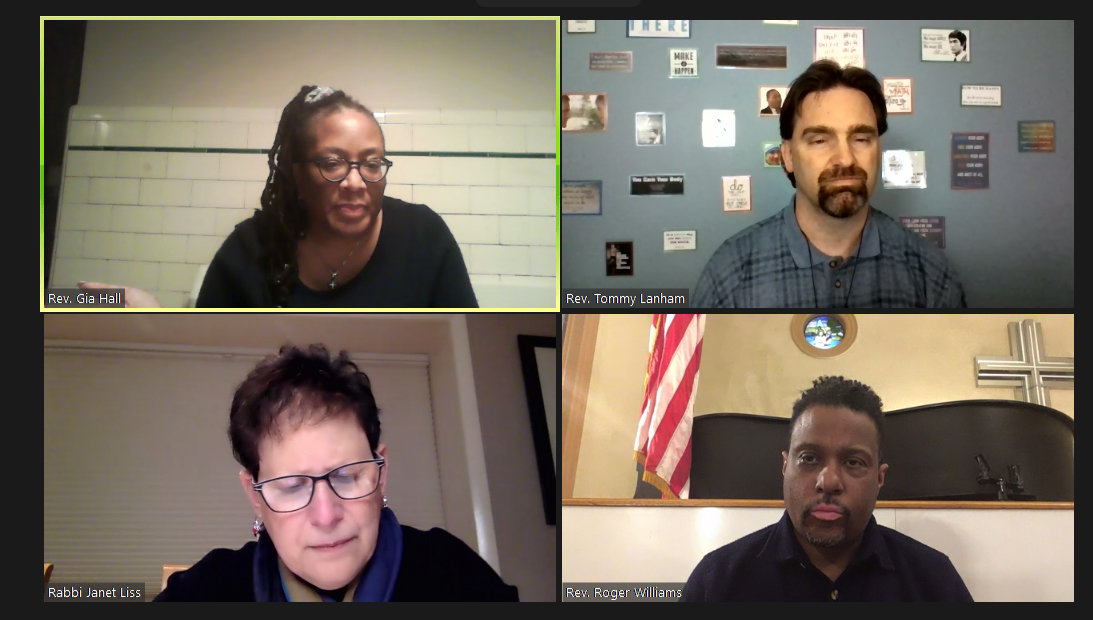Faith leaders virtually discuss social justice and religion
On Feb. 21, four of Glen Cove’s faith leaders held a discussion open to the public over Zoom about the relationship between religion and social justice.
The Rev. Roger Williams of First Baptist Church of Glen Cove, Rev. Gia Hall of the United Methodist Church, Rev. Tommy Lanham of Glen Cove Christian Church and Rabbi Dr. Janet B. Liss of North Country Reform Temple spent the night discussing certain texts in holy books like the Bible and the Torah, as well as their role in social justice as leaders of congregations.
Since the pandemic changed the life of every North Shore resident, Williams, Hall, Lanham and Liss have met virtually to discuss ways they can serve the community. The four have developed a great relationship, Williams said.
The passion for social justice and serving others in Judaism originates in the ancient words of the Prophets, Liss said. And similarly, those of the Christian faith are inspired by the Gospel. Williams, Hall and Lanham quoted verses that highlighted the importance of serving and respecting others.
“Jesus defined social justice as loving others, to love others as you love yourself,” Hall said. “If we love ourselves and we love our neighbors, we are dealing with equity. We are dealing with human life. We are dealing with nurturing one another. We are dealing with compassion. We’re dealing with respect.”
If people are being harmed, are hungry or are in need, those who are followers of God, Hall said, should say or do something “justly.”
The Rev. Dr. Martin Luther King Jr. comes to mind when thinking of a person who was inspired by their faith to work towards a more just society, Williams said.
“A long tradition of faith groups is speaking truth to power and advocating for social change,” Liss said. “[Religious people] were central in major social justice movements throughout our nation’s history, from the abolitionist movements to those involved with desegregation and civil rights, as well as the international arena.”
Hall said that social justice was an aspect of her journey to becoming a minister. Growing up in an all white school, she said, her guidance counselor had asked her why she had wanted to go to college for higher education instead of becoming a hairdresser.
“There’s nothing wrong with being a hairdresser but he wanted to know why I didn’t want to do that like my mom,” Hall said. “It was clear to me that he didn’t know who I was. My mother was not a hair dresser, my mother was in computers and my father was an educator.”
She said she never forgot that experience. Hall would later go on to lead a career in education, starting out as a superintendent of a Sunday school program and advocating for the importance of equitable education.
Liss said she, too, had the desire to advocate for social justice, doing so throughout her years as a rabbi. “It’s not my job to make people feel comfortable,” she said. “It’s my job to teach what Judaism has to say, and that sometimes can be very comfortable to people and speaking truth takes people out of their comfort zone, but I feel like that’s our role as clergy.”
Clergy should engage people in doing what’s right and making the moral decisions, Liss assed, especially in today’s social and political environment.
“As people of faith, we have a call on our life,” Lanham said. “It’s because we have a call, from God, a divine call to make this world a better place.”
Having conversations like this, Williams said, is just the beginning.






